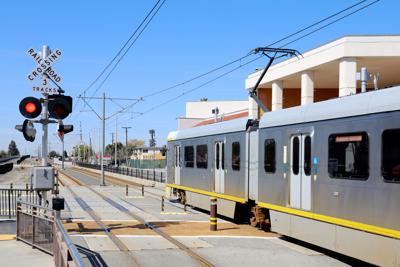
(Laser1987/Getty Images)
Metro's Board of Directors Thursday extended the contract for CEO Stephanie Wiggins, who will continue to lead the transit agency as it undertakes major initiatives in preparation for upcoming global events.
In a 12-0 vote, directors extended Wiggins' contract for an additional four-years with an option for a one-year renewal at the discretion of the board. Wiggins annual starting salary will be $510,806.94, a pay bump of more than 20% compared to her previous compensation of $400,004.80, with an annual increase of $110,802.14.
County Supervisor and Metro director Holly Mitchell was absent during the vote.
The contract will take effect June 1.
The board consists of county Supervisors Janice Hahn, Kathryn Barger, Lindsey Horvath, Hilda Solis and Mitchell; Los Angeles Mayor Karen Bass; L.A. City Council members Katy Yaroslavsky and Imelda Padilla; Inglewood Mayor James Butts; Pomona Mayor Tim Sandoval; Whittier City Councilman Fernando Dutra; and Jacquelyn Dupont-Walker, the founding president of the Ward Economic Development Corporation, a faith-centered organization serving South L.A.
All members of the board supported Wiggins, citing her leadership and ability to get things done.
Wiggins was first appointed as Metro CEO on April 8, 2021.
As head of the regional transit agency, Wiggins has led ridership recovery that was lost due to the COVID-19 pandemic, managed the completion of major construction projects, including the Regional Connector, reconfiguring the A and E lines; and expanding bus lanes.
Also, under her leadership, Metro has tackled public safety issues. Last year, highly publicized violent crimes plagued the agency.
Last year in April, a 66-year-old woman was stabbed to death on Metro's B (Red) Line in an unprovoked attack. Earlier that month, a Metro bus operator was stabbed in the chest in Willowbrook, which later prompted bus drivers to protest safety concerns with a “sick-out”.
The agency, in turn, expanded its unarmed Ambassador program, and deployed more security officers and installed protective barriers on all its buses. Additionally, it's fostering a "see something, say something" culture with its riders.
The agency is in the middle of establishing its own in-house police department, which they aim to have operational by 2029.
This would not be the first time Metro has had its own safety department. From 1978 to 1997, Metro and its predecessor, the Southern California Rapid Transit District (SCRTD), which merged into Metro in 1993, operated its own police force.
Currently, Metro contracts with LAPD and the L.A. County Sheriff’s department to coordinate their safety plan.
Other initiatives include a crackdown on fare evaders with the installation of taller fare gates at all new rail stations and some existing ones. Metro is also piloting weapons detection systems.
According to board members, they anticipate Wiggins will be well equipped to manage multiple projects ahead of the Olympics, which can be found at www.metro.net/28x28/.
The projects, known as the Twenty-Eight by '28 Initiative, are a mix of transit solutions to improve connectivity to major sports venues.
Projects in the pipeline include LAX/Metro Transit Center Station, set to open June 6; J Line Electrification; new pedestrian and bike paths in South Los Angeles and Inglewood; Purple Line Extension; Gold Line Foothill extension to Pomona; and improvements to the G Line in the San Fernando Valley.
In addition to previously serving as CEO of Metrolink from 2019-21, Wiggins held various positions with Metro from 2008 to 2018, including a nearly four-year stint as deputy CEO.
Wiggins received her bachelor of arts degree in business administration from Whittier College in 1992, later earning her Master's in the same field from the USC Marshall School of Business in 2007.
“LA Metro is thrilled to announce that Stephanie Wiggins will continue leading the agency for the next four years,” Metro said in a statement to CALÓ News. “To date, ridership numbers are up 55% after making enhancements to operations and major public safety initiatives, including the completion of the K Line and the Regional Connector and our safety improvements to ensure an engaged visible presence of uniformed personnel, better protection of bus operators, and improvements to the station experience.”











(0) comments
Welcome to the discussion.
Log In
Keep it Clean. Please avoid obscene, vulgar, lewd, racist or sexually-oriented language.
PLEASE TURN OFF YOUR CAPS LOCK.
Don't Threaten. Threats of harming another person will not be tolerated.
Be Truthful. Don't knowingly lie about anyone or anything.
Be Nice. No racism, sexism or any sort of -ism that is degrading to another person.
Be Proactive. Use the 'Report' link on each comment to let us know of abusive posts.
Share with Us. We'd love to hear eyewitness accounts, the history behind an article.